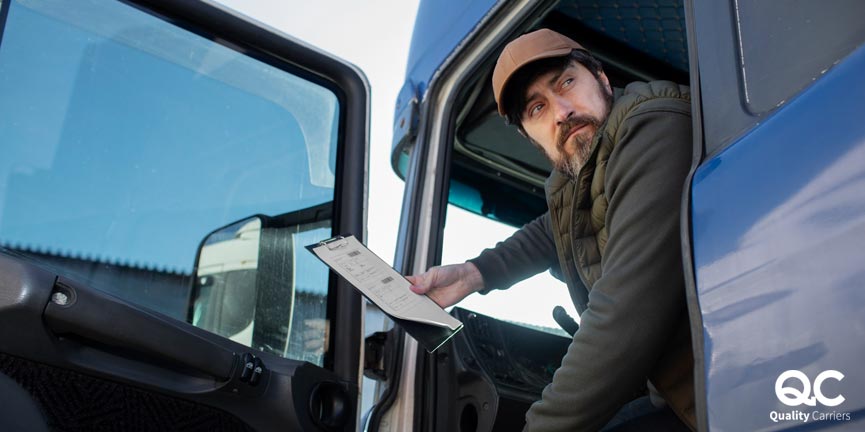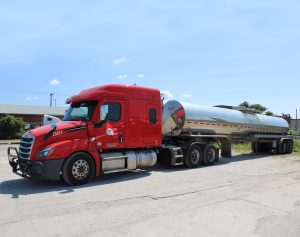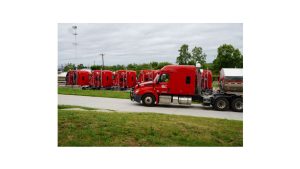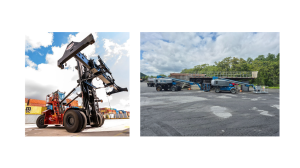The trucking industry offers diverse opportunities for individuals who aspire to be owner operators. This journey towards independence and entrepreneurship begins with understanding the permitting requirements.
This blog will explore the essential owner operator permitting requirements, equipping you with the knowledge to navigate this path successfully.
Operating as an owner operator in the trucking industry involves several permitting and regulatory requirements. Ensuring that you meet these requirements is crucial for legal and safe operation. Here are some of the essential owner operator requirements for owner operators:
1. Federal DOT Number
A Federal Department of Transportation (DOT) Number is mandatory for most commercial vehicles involved in interstate commerce. It tracks a carrier’s safety information and compliance with federal regulations. You’ll need your DOT Number even if you operate as an owner operator.
2. MC Number / Operating Authority
An MC Number, a Motor Carrier Operating Authority, is required for for-hire carriers involved in interstate commerce. It authorizes you to transport regulated goods across state lines. Obtaining an MC Number involves filing the appropriate paperwork and meeting insurance requirements.

3. Drug Testing
As a commercial motor vehicle driver, you must adhere to drug and alcohol testing regulations enforced by the Federal Motor Carrier Safety Administration. You must undergo pre-employment drug testing, and random testing may be required while on the road.
4. Unified Carrier Registration
The Unified Carrier Registration program is a federal system in the United States that requires individuals and companies to operate commercial motor vehicles. This program supports state and federal motor carrier enforcement programs, promotes highway safety, and ensures that motor carriers comply with federal regulations.
The UCR program replaces the Single State Registration System (SSRS) and is administered by a UCR Board representing states and industry stakeholders. The fees collected through UCR fund state enforcement efforts, motor carrier safety activities, and related administrative costs.
UCR Exceptions:
While the UCR program generally applies to most motor carriers involved in interstate commerce, there are some exceptions and nuances:
- Small Carriers: Carriers that operate vehicles under 10,001 pounds in gross weight do not need to register under UCR.
- Private Carriers: If a commercial motor vehicle is used exclusively for the transportation of property by an individual or company, not for hire or compensation, it may be exempt from UCR requirements.
- Farm Vehicles: Certain farm vehicles that meet specific criteria, such as being used for agricultural purposes within a 150-mile radius of the farm, may be exempt from UCR.
- Government Entities: Vehicles owned or operated by the federal government, tribal governments, or state and local governments are generally exempt from UCR.
- Non-Participating States: Some states do not participate in the UCR program, and carriers based in those states may have different registration requirements.
5. 2290
The Heavy Vehicle Use Tax (HVUT), or IRS Form 2290, is an annual tax obligation imposed on vehicles weighing 55,000 pounds or more. This tax is collected to fund highway maintenance and construction projects. Owner operators must file Form 2290 and pay this tax to comply with federal regulations.
6. Fuel Tax Agreement IFTA License and Decal
International Fuel Tax Agreement (IFTA) is a critical component of owner operator requirements for those involved in long-haul trucking. IFTA is an agreement between the 48 U.S. states and Canadian provinces. It streamlines reporting and paying fuel taxes for interstate motor carriers. Here’s what you need to know about the IFTA license and decal:
- IFTA License: To participate in the IFTA program, you must obtain an IFTA license from your base jurisdiction, which is usually the state where your business is registered. This license allows you to report and pay fuel taxes in all participating jurisdictions. You need to apply for this license annually.
- IFTA Decal: Along with your IFTA license, you’ll receive a set of decals for each qualified vehicle. These decals must be prominently displayed on your truck. They prove you have paid fuel taxes and are authorized to travel in IFTA jurisdictions. Decals are typically issued in pairs, one for each side of the vehicle.
Under the IFTA program, owner operators must keep detailed records of fuel purchases and miles driven in each jurisdiction. You must report these figures quarterly to your base jurisdiction, which then distributes the appropriate fuel tax revenue to the states and provinces where you operate.
7. Apportioned Plates or Intrastate Decals
Apportioned Plates: These license plates indicate that a commercial vehicle is authorized to operate across multiple states or jurisdictions. They are typically used by owner operators and trucking companies whose vehicles travel through various states as part of their operations. Apportioned plates demonstrate that the vehicle owner has complied with the International Registration Plan (IRP), a program that simplifies commercial vehicle registration and taxation in multiple states. The fees for apportioned plates are based on the vehicle’s weight, the number of states it will operate in, and the miles traveled in each state. This program streamlines the administrative processes for truckers who would otherwise need to obtain individual registrations in each state they operate within.
Intrastate Decals: Intrastate decals are vehicle identification stickers or markings used by commercial vehicles that operate exclusively within a single state’s boundaries. These decals indicate that the vehicle is not engaged in interstate commerce and is solely subject to the regulations, taxes, and fees of the state where it operates. Intrastate decals help state authorities distinguish vehicles that don’t cross state lines from those involved in interstate commerce, allowing for more straightforward enforcement of state-specific rules.
8. Annual Inspection Copy for Truck and Trailer
This is an essential document that verifies your truck and trailer’s safety and roadworthiness. Owner operators must undergo an annual inspection of their commercial vehicle, typically performed by a qualified inspector. You’ll receive a certificate or sticker indicating compliance if your truck and trailer pass this inspection. Keeping a copy of this certificate or sticker in your vehicle is crucial, demonstrating that your equipment meets safety standards and is fit for the road.
9. Insurance

Having the right insurance coverage is non-negotiable in the trucking industry. Before legally operating your commercial vehicle, you must ensure you have sufficient insurance coverage in effect. This typically includes liability insurance, which covers damages to other vehicles in the event of an accident. Also, a cargo insurance protects the goods you’re transporting. The insurance requirements can vary depending on your jurisdiction, the type of freight you haul, and your agreements with shippers or carriers.
10. Title Receipt or Copy of Title (plus a Lease if Applicable)
If you own your truck outright, you must provide proof of ownership, usually in the vehicle’s title or a title receipt. In cases where you’re leasing the truck, you’ll need to present a copy of the lease agreement, which shows your legal right to operate the vehicle. Ownership or leasing documents are critical for demonstrating your authority to use the truck commercially.
11.CDL
The Commercial Driver’s License (CDL) is a prerequisite for individuals driving commercial motor vehicles in the United States. To obtain a CDL, you must pass written and skills tests specific to the class and type of vehicle you intend to operate. This license demonstrates your knowledge and skills as a professional driver and is a legal requirement for trucking. It’s essential to carry your CDL while driving, as law enforcement may request to see it during inspections or traffic stops.
Becoming an owner operator offers independence and opportunities for growth in the trucking industry. However, navigating the permitting requirements is a critical aspect of this journey. By understanding and fulfilling these requirements, you’ll ensure that you can operate legally and maintain safety on the road. Remember to consult with experts or regulatory agencies to stay current with any changes or additional requirements specific to your situation. Have a safe trip on your path to owner operator success!
FAQs about Owner Operator Permitting Requirements
No, drug testing for owner operators is typically an ongoing requirement. You may experience random drug testing throughout your career to ensure compliance with federal regulations. It’s crucial to stay prepared for these tests.
Yes, it’s advisable to have copies of your essential permitting documents, including your MC number, insurance, IFTA license, and any other relevant permits, readily accessible in your truck at all times. Law enforcement or inspectors may request to see these documents during roadside inspections.
You must have an International Fuel Tax Agreement license and decal to operate in multiple states and transport goods. This allows you to report and pay fuel taxes to multiple states using a single, standardized process.
Some owner operator jobs and trucking companies may offer assistance with permitting requirements, such as obtaining necessary licenses and permits. It’s essential to inquire about such assistance when considering job opportunities.




